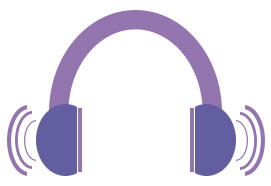Hello there! And welcome to this topic where you will learn how to express daily life events through a vast and useful structure in English: the use of verbs followed by infinitive and gerund.
For that matter, it might be better for you to do it through arts, which is a widespread area on the use of verbs to describe and explain things and ideas.
In addition to this, you are going to sail through texts and speeches so you can practice this grammar structure, not by only memorizing information.
Last but not least, there will be some exercises per ability; reading, listening, writing and speaking where you might find yourself grading your development.
Let’s waste time no more! And continue to know essential elements for interested English speakers!
At the end of this topic, you will:
• Distinguish between the use of verbs followed by infinitive or gerund through contextualized settings. The purpose is to express facts about daily life events.

Here you will find two remarkable anecdotes of a famous surrealist painter. In the end, you will discover who he is.
Please read the following anecdote, then drag the phrases on the right and put them in the correct space.
Drag the different options to the appropriate spaces to complete the sentences. You have two attempts to answer the exercise..
There will be no score, but it is still recommended that you practice.

Click on this painting to discover his identity.

Without a shadow of a doubt, Dalí was as eccentric as his paintings, now read a different anecdote of the Spanish genius and put in order the following story.
Drag the different paragraphs to the appropriate space, so the story makes complete sense. You have unlimited attempts to answer the exercise. You can know your score at the end of the exercise.
As you could have noticed in the previous anecdotes, there are some verbs and prepositions followed by a gerund, while an infinitive can follow other verbs and adjectives.
Let’s analyze some rules.
Look at the following chart, here there are some verbs and prepositions that are followed by –ing (gerund).
Drag the different elements from the left column to the appropriate space in the right column. You have two attempts to answer every item.
In the following chart, you will find some verbs and adjectives that are followed by an infinitive. Drag the sentences on the right and place them in the correct space. Try to do your best. There will not count for evaluation.
On the other hand, some verbs can accept both forms: infinitive and gerund. However, there is a difference in meaning.
Look at the following chart and read the sentences, then drag the meanings on the right and place them in the correct space:
Exercise 6
According to the previous contextualized examples and the grammar explanation, you will play domino.
Drag and match the beginning of the sentences with the right endings.
Activity 1
Do you always remember essential things? Has it happened to you forgetting birthday dates?

Pexels. (2016). Birthday [photo]. Taken from http://bit.ly/2kCh8tV

TerriC. (2017). Aniversary [photo]. Taken from http://bit.ly/2kWPefJ
Read the following story about Camille and Samantha so you can have enough information for the next activities.
Click on each arrow so you can see the information below.
Activity 1.1
According to the previous story, choose the most appropriate option for the following statements. You can know your score at the end of the exercise.
Activity 1.2
Coming back to Camille’s anecdote, but this time to practice the grammar structure within each statement.
Activity 2
Have you ever asked yourself about what the key to success is?
Infinitives and gerunds are very common when someone is giving a particular perspective about something because they help to describe and explain ideas.
Watch the video and listen to some advice from the famous actor, Will Smith.
AccelerateMe. (2010, 14, enero). Will Smith shares his secrets of success. [archivo de video]. Taken from: <https://goo.gl/ekihsM>
Activity 2.1
Here you will find more suggestions to have success in life extracted from the video of Will Smith.
Read the following sentences and write the correct form of the verbs (-ing or infinitive) if it’s necessary to check the chart presented in the content.
Activity 3
Do you like watching TV series? What’s your favourite TV series?
Imagine that you had the opportunity to write at least one episode of your favourite TV series.
Click on the arrows back and forward so you can see the information, or you can also use the bullets below to read through the images.
Here you will find some characters for your episode.
First, think about the plot about what will happen in this episode. You may choose one of the next suggestions:
Then choose at least eight verbs or phrases from the following chart and write the episode as a narrative, you can use either the present or past tense. It’s not necessary to include all the characters, but be careful not to extend too much: write your narration using between 180 - 270 words.
|
|
Read the following example:
Once you've made your selection, use the following rubric as a guide for your writing.
Activity 4
Do you remember an exciting, memorable or unexpected experience you have had with your family, a friend or your sweetheart? Would you mind sharing it with us?
Choose one of the following topics which you might feel uncomfortable:
Once you have chosen the topic, prepare a speech in which you have to include at least six verbs or phrases followed by –ing or infinitive from the box below.
Suggested verbs and phrases:
|
|
Requirements:
Click to listen to an example here:

Use the following rubric as a guide, before planning your speech.
Now, start working in your speech, practice it as much as needed to be ready. You can use http://vocaroo.com/ to record yourself.
Once you have finished use the rubric given to get your score and take a look at the feedback.
Now, it’s time you check how much you’ve learned. Solve the follow self-assessment. It won’t have any score, but it is intended that you recognize your own mistakes and keep them in mind so you can practice later.